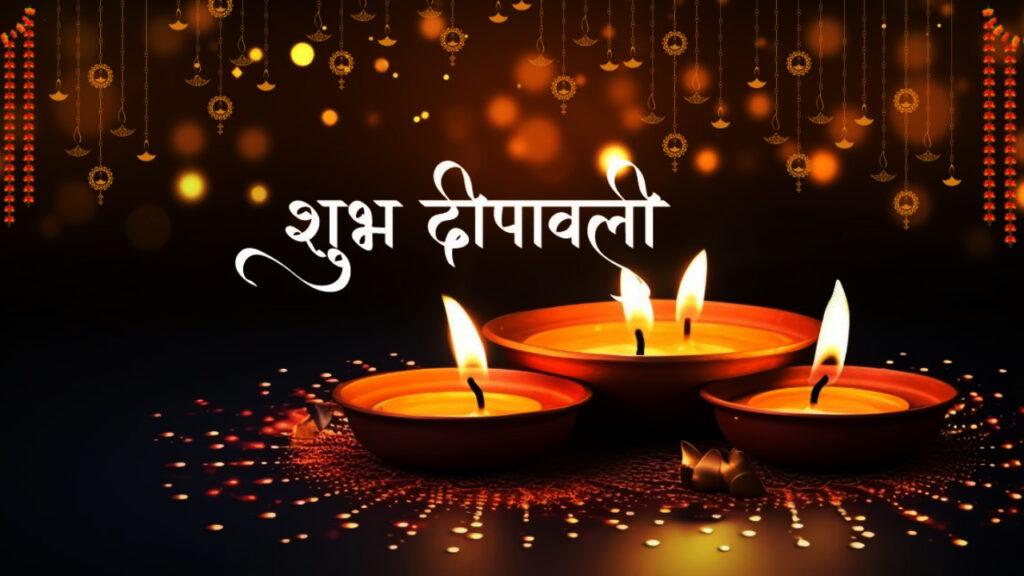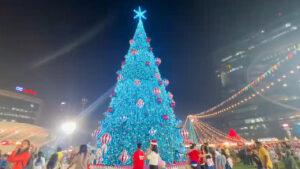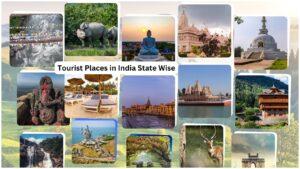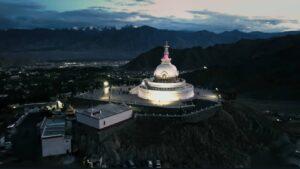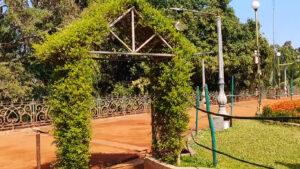Diwali, also known as Deepavali, is one of the most significant and widely celebrated festivals in India. It is a festival of lights that symbolizes the victory of light over darkness, good over evil, and knowledge over ignorance. In 2024, Diwali will be celebrated on November 1st. Delves into the dates, muhurat (auspicious timings), history, and various aspects of Diwali.
Dates and Muhurat for Diwali 2024
Diwali is a five-day festival, each day having its own significance and rituals. Here are the dates and important muhurat for Diwali 2024:
Dhanteras (October 29, 2024): Day marks the beginning of Diwali celebrations. It is dedicated to Dhanvantari, the god of health and Ayurveda. People buy gold, silver, and utensils as it is considered auspicious.
You May Read
Naraka Chaturdashi (October 31, 2024): Also known as Choti Diwali, this day commemorates the victory of Lord Krishna over the demon Narakasura. It is a day for early morning rituals and cleansing.
Lakshmi Puja (November 1, 2024): Main day of Diwali when Goddess Lakshmi, the deity of wealth and prosperity, is worshipped. Muhurat for Lakshmi Puja is from 18:56 to 20:26.
Govardhan Puja (November 2, 2024): Day is dedicated to the worship of Lord Krishna, who lifted the Govardhan Hill to protect the villagers from torrential rains.
Bhai Dooj (November 3, 2024): Final day of Diwali is dedicated to the bond between brothers and sisters. Sisters pray for their brothers’ well-being and perform aarti.
History and Significance of Diwali
History of Diwali is rich and varied, with different regions and communities having their own legends and stories associated with the festival. Most popular ones:
Return of Lord Rama: In North India, Diwali is celebrated to mark the return of Lord Rama to Ayodhya after 14 years of exile and his victory over the demon king Ravana. People of Ayodhya lit oil lamps to welcome him back, and this tradition continues to this day.
Goddess Lakshmi: In many parts of India, Diwali is associated with the worship of Goddess Lakshmi. It is believed that on this day, she emerged from the ocean of milk during the churning of the sea (Samudra Manthan) and married Lord Vishnu.
Narakasura’s Defeat: In South India, Diwali commemorates the victory of Lord Krishna over the demon Narakasura. Event symbolizes the triumph of good over evil.
Mahavira’s Nirvana: For Jains, Diwali marks the nirvana (spiritual liberation) of Lord Mahavira, the 24th Tirthankara, in 527 BCE.
Bandi Chhor Divas: Sikhs celebrate Diwali as Bandi Chhor Divas, which marks the release of Guru Hargobind Ji from the prison of Mughal Emperor Jahangir.
Rituals and Traditions
Diwali is celebrated with great enthusiasm and joy across India and in many other parts of the world. Common rituals and traditions associated with the festival:
Cleaning and Decorating Homes: In the days leading up to Diwali, people clean and decorate their homes to welcome Goddess Lakshmi. Rangoli designs made with colored powders, flowers, and lamps adorn the entrances of houses.
Lighting Diyas and Candles: On Diwali night, homes, temples, and public spaces are illuminated with diyas (oil lamps) and candles. Symbolizes the dispelling of darkness and ignorance.
Fireworks: Fireworks are an integral part of Diwali celebrations. Believed to ward off evil spirits and add to the festive atmosphere.
Exchanging Gifts and Sweets: Diwali is a time for sharing and giving. People exchange gifts, sweets, and dry fruits with friends and family as a gesture of goodwill and love.
Lakshmi Puja: On the main day of Diwali, families perform Lakshmi Puja to seek the blessings of the goddess of wealth. The puja involves the chanting of mantras, offering of flowers, sweets, and lighting of lamps.
Feasting: Diwali is also a time for feasting. Special dishes and sweets like laddoos, barfis, and kheer are prepared and enjoyed with family and friends.
Regional Variations
While the essence of Diwali remains the same, the way it is celebrated varies across different regions of India:
North India: In North India, Diwali is celebrated with great pomp and show. Festivities include the lighting of diyas, bursting of crackers, and elaborate Lakshmi Puja. Markets are bustling with people buying new clothes, sweets, and gifts.
South India: In South India, Diwali is known as Deepavali. Celebrations begin early in the morning with an oil bath, followed by the bursting of crackers and special prayers. Focus is on the victory of Lord Krishna over Narakasura.
West Bengal: In West Bengal, Diwali coincides with Kali Puja, dedicated to the worship of Goddess Kali. Rituals involve elaborate decorations, lighting of lamps, and offering of sweets and animal sacrifices.
Maharashtra: In Maharashtra, Diwali is a five-day festival starting with Vasu Baras and ending with Bhai Dooj. Highlight is the Lakshmi Puja, where people worship gold and silver coins along with the goddess.
Gujarat: In Gujarat, Diwali marks the beginning of the new financial year. Celebrations include the worship of Goddess Lakshmi, lighting of lamps, and the famous Garba and Dandiya Raas dances.
Environmental Concerns
There has been growing awareness about the environmental impact of Diwali celebrations, particularly the use of fireworks. Bursting of crackers leads to air and noise pollution, which can have adverse effects on health and the environment. Many people are now opting for eco-friendly ways to celebrate Diwali, such as:
Using Eco-Friendly Diyas: Instead of plastic or chemical-based diyas, people are using clay lamps that are biodegradable and environmentally friendly.
Avoiding Fireworks: Some families are choosing to avoid fireworks altogether or opting for green crackers that produce less pollution.
Recycling Decorations: Using reusable and recyclable materials for decorations helps reduce waste and environmental impact.
Organic Rangoli Colors: Using natural and organic colors for rangoli designs instead of synthetic ones.
Diwali Wishes 2024
For Social Media:
- Wishing you a Diwali filled with light, love, and laughter. Happy Diwali 2024! 🪔✨
- May the brightness of Diwali illuminate your life with endless joy and prosperity. Happy Diwali! 🎆
- Let’s celebrate the festival of lights with smiles and positivity. Wishing you all a joyous Diwali 2024! 🪔💥
- May the lamps of Diwali light up your path toward success and happiness. Have a wonderful Diwali! 🌟🎉
- This Diwali, may all your dreams and goals come true. Wishing you a bright and prosperous Diwali! 🪔✨
- Let’s welcome the festival of lights with hope, joy, and positivity. Happy Diwali to all! 🎇✨
- May Diwali bring joy, health, and endless happiness to you and your loved ones. 🪔💖
- Sending you sparkling Diwali wishes! May this festival of lights brighten your days ahead. ✨🎆
- May this Diwali fill your life with colors, peace, and prosperity. Happy Diwali 2024! 🎇🪔
- Diwali is a time to celebrate togetherness. Wishing you and your family a joyful and blessed Diwali! 🪔🎉
For Corporate Office:
- Wishing you and your team success, happiness, and prosperity this Diwali 2024. Happy Diwali! 🪔✨
- May this Diwali bring new opportunities and growth to your business. Have a prosperous Diwali! 🌟
- Let the festival of lights inspire new ideas, innovation, and excellence. Happy Diwali to our valued partners! 💼✨
- Wishing you a Diwali filled with light and success in all your future endeavors. Happy Diwali 2024! 🪔🎇
- May the spirit of Diwali strengthen our bonds and guide us toward a bright and prosperous future. Happy Diwali! ✨🌟
- On this Diwali, let’s light the way to new opportunities, prosperity, and shared success. Happy Diwali 2024! 🪔🎉
- Wishing our team and clients a successful year ahead. May this Diwali bring light and joy to all! 🎇💼
- As we celebrate Diwali, let’s embrace the light of new opportunities and collaborations. Happy Diwali! 🪔✨
- May the festival of lights bring joy to your heart and success to your workplace. Wishing you a bright Diwali! 🌟💼
- Wishing our partners, colleagues, and clients a Diwali filled with joy, prosperity, and new achievements. Happy Diwali 2024! 🪔🎆
FAQs
What is Diwali?
Diwali, also known as Deepavali, is a Hindu festival of lights celebrated to mark the victory of light over darkness, good over evil, and knowledge over ignorance. It is one of the most significant festivals in India and is celebrated with great enthusiasm and joy.
When is Diwali celebrated?
Diwali is celebrated on the 15th day of the Hindu month of Kartika, which usually falls in October or November. In 2024, Diwali will be celebrated on November 1st.
Why do we light diyas during Diwali?
Lighting diyas (oil lamps) symbolizes the dispelling of darkness and ignorance. It is believed that the light of the diyas guides Goddess Lakshmi, the deity of wealth and prosperity, into homes.
What are the five days of Diwali?
- Dhanteras: First day, dedicated to Dhanvantari, the god of health and Ayurveda.
- Naraka Chaturdashi (Choti Diwali): Second day, commemorating Lord Krishna’s victory over the demon Narakasura.
- Lakshmi Puja: Main day of Diwali, dedicated to the worship of Goddess Lakshmi.
- Govardhan Puja: Fourth day, celebrating Lord Krishna lifting the Govardhan Hill.
- Bhai Dooj: Fifth day, celebrating the bond between brothers and sisters.
What is the significance of Lakshmi Puja?
Lakshmi Puja is performed to seek the blessings of Goddess Lakshmi for wealth, prosperity, and well-being. It involves rituals such as lighting lamps, offering sweets, and chanting prayers.
How do different regions celebrate Diwali?
- North India: Celebrations include lighting diyas, bursting crackers, and performing Lakshmi Puja.
- South India: Known as Deepavali, it involves early morning rituals, oil baths, and special prayers.
- West Bengal: Celebrated as Kali Puja, dedicated to Goddess Kali.
- Maharashtra: Includes Vasu Baras, Lakshmi Puja, and Bhai Dooj.
- Gujarat: Marks the beginning of the new financial year with Lakshmi Puja and traditional dances.
What is the significance of Dussehra in relation to Diwali?
Dussehra, also known as Vijayadashami, marks the end of Navratri and the beginning of Diwali preparations. It celebrates the victory of Lord Rama over the demon king Ravana, symbolizing the triumph of good over evil.
Can people of different religions celebrate Diwali?
Yes, Diwali is celebrated by people of various religions, including Hindus, Jains, Sikhs, and Buddhists. Each community has its own unique traditions and significance associated with the festival.
Are there any specific dress codes for Diwali?
While there is no strict dress code, people often wear new and traditional clothes during Diwali. Bright and colorful attire is preferred to reflect the festive spirit.
What are some popular Diwali sweets and dishes?
Popular Diwali sweets include laddoos, barfis, kheer, and gulab jamun. Special dishes like puris, samosas, and chole are also prepared and enjoyed during the festival.
Diwali is a festival that brings people together, fostering a sense of community, joy, and togetherness. It is a time to reflect on the triumph of good over evil, light over darkness, and knowledge over ignorance. As we celebrate Diwali in 2024, let us embrace the spirit of the festival while being mindful of our environmental responsibilities.
